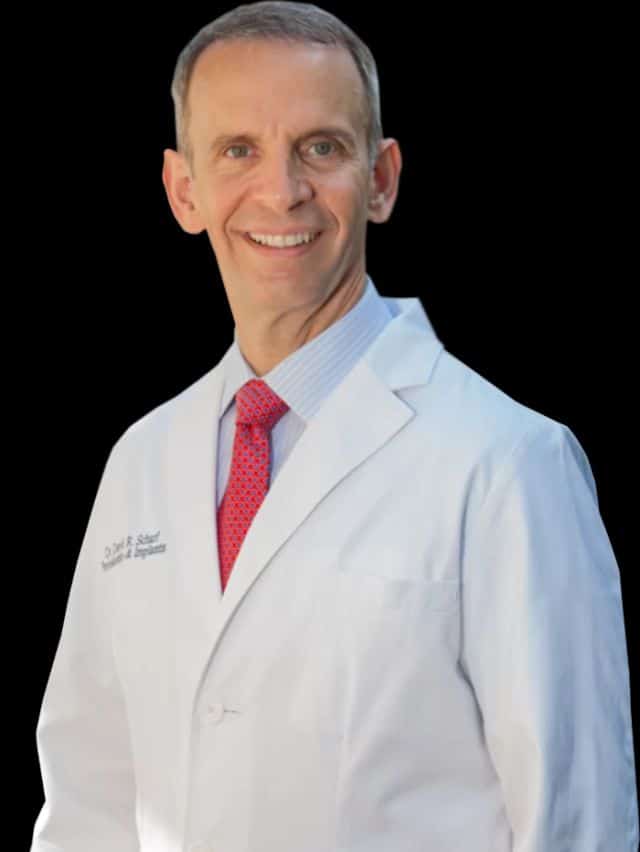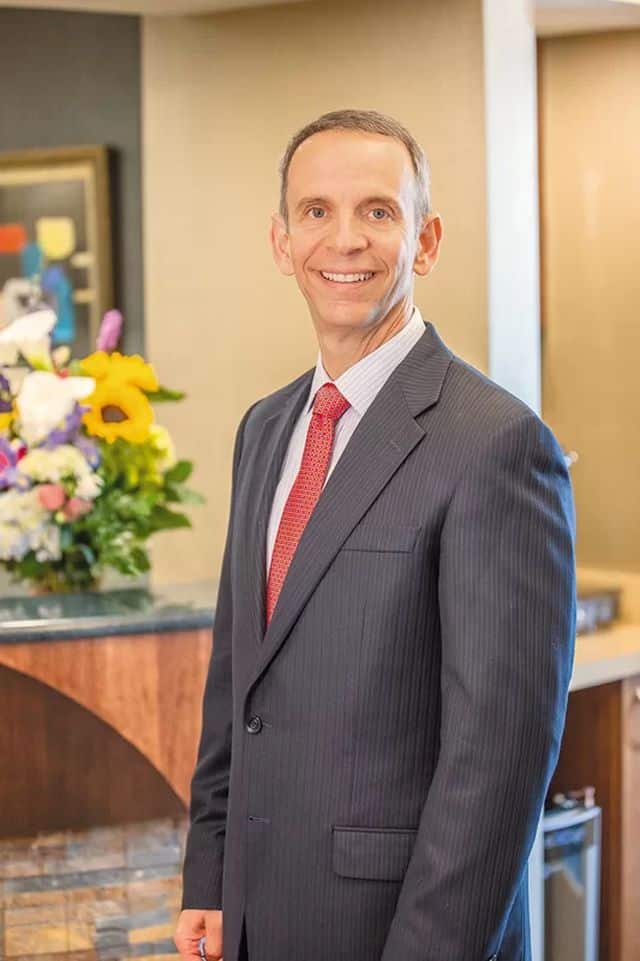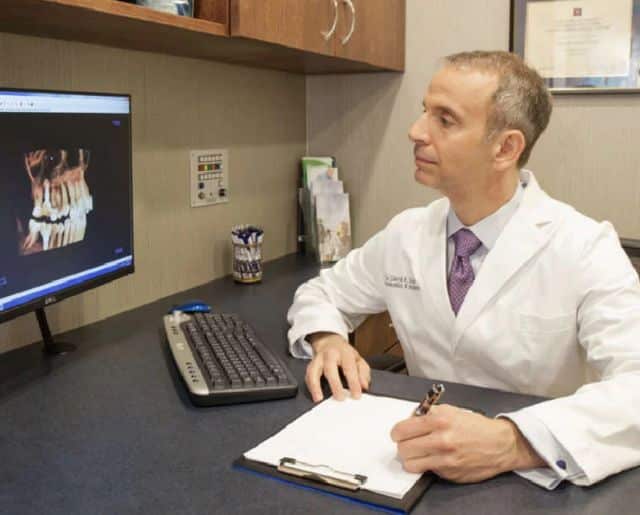Dr. Scharf was raised in North Massapequa and graduated fourth in his class from Plainedge High School with honors. He attended both college and dental school at Boston University, where he graduated cum laude. Dr. Scharf was enrolled in an accelerated honors program where he earned undergraduate and dental degrees in six years instead of the usual eight. (Dr. Scharf was one of only three students selected nationwide for this prestigious program.)
Dr. Scharf was elected to Omicron Kappa Upsilon (the “Phi Beta Kappa” for dentists) and received the Boston University Award for Excellence in Periodontology. He was also awarded the Boston University Predoctoral Prosthetic Award for Excellence in Prosthetics, the Academy of General Dentistry Outstanding Senior Student Award, the Boston University Operative Dentistry Special Achievement Award, and the Quintessence Publishing Company Outstanding Senior Award for Excellence in Clinical Practice. When you choose Dr. Scharf, you are choosing a doctor who graduated at the top of his class!
Following dental school, Dr. Scharf completed a yearlong General Practice Residency at Long Island College Hospital in Brooklyn, New York. As a resident participating in this top New York program, he gained extensive clinical experience in different dental fields such as:
- Prosthodontics
- Periodontics
- Endodontics
- Orthodontics
- Oral Surgery
- General Dentistry
- Management of Medically Compromised Patients
This experience was augmented by clinical rotations in the departments of general medicine, anesthesia, and emergency medicine. This intensive medical training outside the specialty field of periodontics is rare among dentists and makes Dr. Scharf able to offer his patients extra reassurance and confidence in his skills and knowledge.
While completing his residency, Dr. Scharf was asked to join a group practice in general dentistry in Plainview, New York. The years he spent practicing family dentistry gave him a unique perspective as a specialist working together with general dentists to provide the best care for his patients.
Dr. Scharf returned to school full-time for specialty training in the field of Periodontics while continuing his general practice on a part-time basis. He was 1 of 4 dentists chosen out of over 200 applicants for the highly competitive position as a postdoctoral resident in periodontics at New York University, received exhaustive training, and did extensive clinical research in the fields of both dental implants and Periodontics.
Leader In His Field
Dr. Scharf developed a new surgical technique for soft tissue ridge augmentation, and his research has greatly simplified implant surgery. In May 1995, Dr. Scharf became a Diplomate of the American Board of Periodontology. This was the culmination of years of preparation and involved both written and oral examinations. Nationwide, less than 25 percent of periodontists ever reach this level of achievement.
Dr. Scharf held the rank of Clinical Assistant Professor in periodontics at New York University, where he trained dental students in periodontics. He subsequently held the position of Clinical Assistant Professor at the State University of New York at Stony Brook, where he educated dentists training to be specialists in periodontics. Dr. Scharf is currently a Clinical Assistant Professor in the Department of Implant Dentistry at New York University, where he is responsible for providing advanced implant training to other dental specialists. This position also gives him access to new research findings months and even years before publication, allowing him to offer his patients care from the very leading edge of dental research.
Having published numerous articles in major dental journals in the fields of both periodontics and implants, Dr. Scharf is frequently called upon to lecture his colleagues. He has lectured at local, national, and international levels (including in India and Korea) and is the founder and President of the Integrated Dental Group, an organization he created to further the continuing dental education of local dentists. Dr. Scharf is committed to continuing his own education. He is one of a handful of dentists on all of Long Island with over 2,400 hours of continuing education credits. This is over 10 times the required amount of continuing education credits, which showcases Dr. Scharf’s commitment to providing the best in dental care to his patients by staying abreast of the latest dental technologies, methods, and instruments available.
Why His Patients Love Him
Dr. Scharf’s patients continually comment on his kind and gentle manner. He is especially good with apprehensive patients, with a contagious sense of humor and a gentle touch that quickly puts patients at ease. (Please visit the patient reviews section of this site to read what Dr. Scharf’s patients have to say about their experience in his office.)
Dr. Scharf currently divides his time between his thriving practice in Babylon, New York, and his teaching and research responsibilities at New York University. Dr. Scharf lives locally with his wife, Karen, and their three young children, and serves the local community as both a volunteer fireman and an emergency medical technician.
What Are Dental Implants?
A tooth that has become badly infected often needs to be removed to prevent the infection from spreading. A tooth extraction is considered the most invasive of all dental procedures since it does completely remove the tooth. However, dental implants are one of the top dental procedures to consider.
Dental implants are considered an ideal replacement for a missing tooth. Using a titanium screw, it is surgically positioned into the jawbone. The jawbone will fuse with the titanium, becoming strong enough to support a tooth. Once the jawbone has fused with the titanium, a dentist will be able to create a false tooth that is attached to an abutment on the titanium implant. Dental implants look and feel like traditional teeth as they are anchored within the bone and will not become loose like dentures and bridges can.
Am I a Candidate for Dental Implants?
To receive dental implants, you will need to schedule a consultation with our office. We must take X-rays and determine if the jawbone is strong enough to support an implant. Your oral health will be considered as we look for problems that may cause an implant to fail. Failure to have enough jawbone density may require patients to receive surgery like ridge enhancements or bone grafts to build up the jawbone and make it strong enough. As long as the bone grafting is successful and the gums are healthy, patients are usually cleared for dental implant surgery.
Dr. David Scharf pointing to a screen. Female patient in dental chair.
Although there are certain instances where dental implants can’t be placed immediately, Dr. Scharf can help most people become viable candidates. Some issues that might delay dental implant placement:
1. Uncontrolled Illnesses: In order for dental implants to anchor and heal successfully, patients should be generally healthy and free of disease. Certain health problems, including cancer, hemophilia, diabetes, and autoimmune disorders can disrupt a person’s ability to heal after surgery.
2. Certain Medications: Some patients who take certain medications may not be right for dental implants. For example, chemotherapy drugs, bisphosphonates, and corticosteroids all have been shown to affect how tissue responds to dental implant surgery.
3. Ongoing Dental or Periodontal Problems: To be a good candidate for dental implant surgery, patients should have generally healthy teeth and gums. Otherwise, the infection is likely to migrate to the implant site and interfere with integration.
4. Insufficient Bone Mass or Density: The jawbone tissue needs to be wide, deep, and strong enough to support a dental implant. Bone mass tends to recede after teeth are lost, so patients who have been living with missing teeth for a while may require bone grafts before implants can be placed.
5. Lifestyle Habits: Poor oral hygiene, excessive drinking or smoking can affect dental implant healing. Patients should maintain an excellent dental hygiene routine before, during, and after surgery. Dental implant surgery is a multi-stage process that can take 4-12 months to complete, patients need to be committed to not smoking or drinking for this timeframe, or they risk dental implant failure.
Why See A Periodontist for Dental Implants, Not A General Dentist?
A Periodontist, like Dr. David R. Scharf, is an expert in the structures that support a tooth – the same structures that will support your dental implant. That makes periodontists specially qualified to provide correctly place dental implants to ensure that they heal well and integrate with the bone as they should. This expertise comes in handy especially if you require tissue regeneration or treatment for gum disease before implants can be placed. In these cases, a general dentist should refer you to a periodontist anyway.
Periodontists are required to complete extra schooling that includes dental implantology and understand that thorough planning is essential for successful implants. This includes proper diagnosis, 3D imaging to assess the quality and quantity of the bone, address gum disease, and a complete treatment plan covering the entire process from beginning to end. Implants can fail as a result of poor placement, but periodontists have the equipment and skills to place or save a failing implant when general dentists cannot.
Why Should I Replace Missing Teeth?
When patients lose their teeth, functionality is diminished, making it hard to chew food properly. Nutrition becomes a problem, which leads to other health concerns. Speaking can be affected if the missing tooth is essential for good diction. The bone usually supporting a tooth’s root is the bone needed to support a dental implant. When a tooth root is missing, the bone structures weaken and begin to resorb into your body. Even your looks will eventually be affected as the bone shrinks, leading to a condition known as facial collapse.
Why Are Dental Implants Better Than Dentures?
In addition to looking completely realistic, implants are durable, firmly anchored, and improve health in the rest of the mouth. Dentures require adhesives to hold them firmly in place and are prone to slipping and even falling out. They can be uncomfortable to wear and sometimes rub your gum tissue until it is sore and painful. When this happens, it requires adjustments and eventually, replacement as your facial structures change. Implants last much, much longer: 20 years or more.
Implants look and feel like your real teeth; they are indistinguishable from your natural teeth, so your beautiful smile can look exactly as it did before the tooth loss. You can eat, speak, and go about your life as normal. Dental Implants prevent bone loss because they are anchored to your bone tissues, and fully integrate with the body’s tissues as they heal.
While dentures require daily removal to be brushed and flossed, they must also be bleached, sanitized, and soaked to stay clean and odor-free. Implants can be cared for as you would care for your natural teeth with regular brushing and flossing.
What factors might add to recovery time?
In an ideal situation, Dr. Scharf can place an implant without making an incision and load a temporary crown immediately. This almost eliminates downtime. But often, other factors come into play. Recovery time is affected by the number and location of the implants. If you need a bone or soft tissue graft it could take longer. If you require an incision (teeth that have been missing for awhile), it will have to heal.
How do I take care of my implants while they are healing?
It is critical to maintain good oral hygiene while you are recovering. During the first 24 hours after the procedure, it may be helpful to rinse out your mouth with a warm salt water solution. (Do not use mouthwash or peroxide rinse.) After 24 hours have passed, you can begin to gently brush your teeth again. Take any medications that have been prescribed to you as directed.
How much pain will I feel?
For most implants, the pain is far less than you might expect from surgery. Typically it requires only a small incision in the gums. Since bone has no nerve endings, this will create no pain. Depending on the invasiveness of your procedure, you may be given a prescription pain relief medication. If you are not prescribed pain medications, you may take an over-the-counter analgesic such as ibuprofen (Advil) or acetaminophen (Tylenol) as needed. After a day or so, any pain should be gone.
What can I eat, and when?
An hour after surgery, when you are able to remove the first set of gauze you may have something soft to eat. Avoid hot liquids or drinking from a straw for the first 24 hours. After the first day you can move on to firmer foods, but let your comfort level be your guide. Do not eat anything that causes pain while you recover.
What can I expect during the healing process?
Some soreness and tenderness are common, but it should continue to feel better with each passing day. If the pain becomes increasingly worse, please contact us. Swelling can also occur on the face near the surgical site and will ease over two or three days. Ice applied to the face and an anti-inflammatory drug (such as ibuprofen) can help decrease any swelling and discomfort. You may have a slight temperature following the procedure, but it should not exceed 101.5. If this occurs, please contact us. You may experience some dizziness or nausea due to the medications or swallowing blood. This is normal and should subside within 24 hours after cessation of those medications.
How long will it take to fully recover?
There are many factors that contribute to the recovery period for dental implant surgery. If you only receive one or two implants and did not receive bone or tissue grafts, recovery can take place in as little as 1-2 days. If you receive many dental implants and needed any grafts, the recovery time can take closer to a week or two. Other considerations are age, health, and hygiene.
When can I resume regular activity?
Some patients are able to return to work the same day as their surgery. Others may need to take a day or two to recuperate. We recommend not driving while the anesthesia wears off until you see what kind of pain you’re dealing with. Beyond that, do what you feel comfortable doing. Please avoid any strenuous activity until 3 days have passed and you are no longer taking any narcotic medications.
Is it okay to smoke after receiving dental implants?
Along with the normal health problems that arise from tobacco, it can be detrimental to the healing process after receiving dental implants. Smoking can lead to infection and implant failure. At least for the week following your implant surgery, avoid smoking and the use of chewing tobacco.
When will I receive my permanent crowns?
When you leave the office, you will likely have temporary crowns which will act as regular teeth until you receive your permanent crowns or caps. This usually takes place 4-6 months after the surgery, so that full healing can take place. However, if your procedure was minimally invasive, you may receive your permanent crowns much sooner. In some cases, patients receive their permanent crowns on the day of surgery.
How do I take care of my dental implants after they are healed?
Your dental implants function the very same way as your natural teeth. It is important to brush, floss, and rinse, and to see your dentist regularly for check-ups and cleaning. While you won’t get cavities in your dental implants, they are susceptible to regular wear and tear, so the better care you give them, the longer they will last and the stronger they will be. It is also important to take good care of the gum tissue surrounding your implants, as the health of your gums has a direct effect on the health and strength of the supporting jaw bones.
Here at Dr. Scharf’s office, we want the best for you and your teeth. We believe that by educating our patients you will be able to make the best decisions about your health and be happy with the outcome. When we work together with our patients to help understand their needs, and effectively treat them, the results are extraordinary. Let us help you reach your dreams of having strong, beautiful teeth for many years to come.





